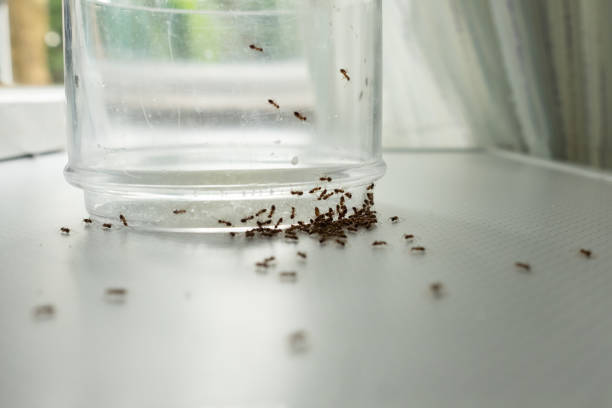Ants
Ants are one of the most common household pests, often invading kitchens, bathrooms, and even outdoor areas. While they may seem harmless at first, an ant infestation can quickly get out of control if not addressed. In this blog, we’ll cover the steps you can take to effectively eliminate ants and prevent them from coming back.
1. Identify the Type of Ant
Before you start treating the problem, it’s important to identify the type of ant you’re dealing with. Different ants require different treatment methods. Common types include:
- Carpenter Ants: Known for nesting in wood and causing structural damage.
- Odorous House Ants: Emit a rotten smell when crushed.
- Pavement Ants: Usually found nesting in cracks of sidewalks or driveways.
Knowing the type of ant helps you choose the right treatment to eliminate them effectively.
2. Find the Source
Ants are attracted to food and water sources, so the first step in dealing with an infestation is to locate and remove these attractions. Follow the ants to find where they are coming from, typically near doors, windows, or cracks in walls. Look for trails of ants that lead you back to their nest.
3. Seal Entry Points
Once you’ve found where the ants are entering your home, seal these entry points to stop them from getting in. Use caulk to fill in cracks around windows, doors, and the foundation of your home. Fix leaky pipes and ensure that food is stored in airtight containers.
4. Use Ant Baits
Ant baits are one of the most effective ways to eliminate an entire colony. Ants take the bait back to the nest, where it is shared with the rest of the colony, including the queen. This leads to the extermination of the entire colony over time. Place baits near ant trails or any area where you’ve seen a high level of ant activity.
5. Natural Remedies for Ant Control
If you prefer a more eco-friendly approach, there are several natural remedies that can help deter ants:
- Vinegar: Wipe down surfaces with a mixture of vinegar and water. The strong smell disrupts the ant’s scent trails.
- Lemon Juice: Like vinegar, lemon juice can mask the scent trails that ants use to find their way.
- Cinnamon or Peppermint Oil: These scents repel ants and can be used as a natural deterrent when applied near entry points.
6. Professional Ant Control Services
If you’re dealing with a large infestation or if DIY methods aren’t working, it’s time to call in the professionals. Pest control experts have the experience and tools to deal with even the most persistent ant problems. They can provide specialized treatments for specific ant species like carpenter ants, which can cause significant damage to your home.
7. Prevent Future Infestations
Once you’ve eliminated the ants, take steps to prevent future infestations:
- Keep your home clean: Wipe down counters, clean up spills, and store food properly.
- Remove standing water: Fix any leaks and ensure that there is no stagnant water around your home.
- Maintain your yard: Trim back trees and bushes, and keep your lawn free of debris.
Final Thoughts
Ant infestations can be a major nuisance, but with the right approach, you can successfully eliminate them and keep them from returning. Whether you choose DIY methods or hire a professional pest control service, taking action early is the key to keeping your home ant-free.
For professional ant control services in [Your City], contact us today to schedule an inspection and get rid of ants for good!


